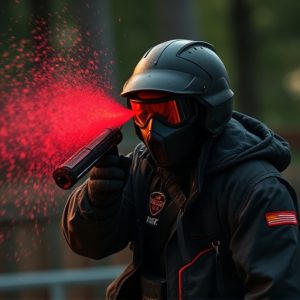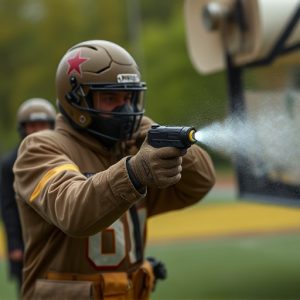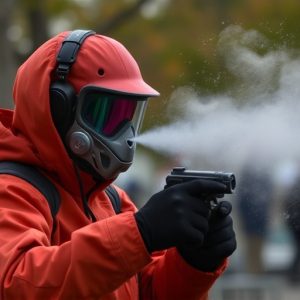Decoding Pepper Spray: Effectiveness and Safety in Self-Defense
Pepper spray is a non-lethal defense tool that uses oleoresin capsicoid to temporarily incapacitate…….
Pepper spray is a non-lethal defense tool that uses oleoresin capsicoid to temporarily incapacitate attackers by causing intense irritation to the eyes, skin, and respiratory system. Contrary to some misconceptions, it does not result in permanent blindness; the effects, which include severe pain and a reduction in visual acuity leading to blurry vision and sensitivity to light, are generally temporary, resolving within 15 minutes to hours and alleviated by water and fresh air. It's important for users to be aware of the potential impacts on themselves and bystanders, considering environmental factors like wind and adhering to local laws. Safe and effective use of pepper spray requires proper storage and training, which also help minimize the risk of accidental exposure. The question "Can pepper spray blind you?" is addressed here: while it can cause temporary blindness, it does not lead to permanent blindness. Understanding its effects and using it responsibly ensures it remains a reliable tool for personal defense.
When it comes to personal safety, non-lethal defense options like pepper spray are often at the forefront of discussion. Known for its immediate and potent effects, this self-defense tool is a popular choice among individuals seeking to protect themselves without causing permanent harm. This article delves into the efficacy and safe usage of pepper spray, addressing common concerns such as “Can pepper spray blind you?” and exploring the impact it has on vision. Understanding the nuances between protection and incapacitation is crucial for anyone considering pepper spray as a means of defense. Join us as we unravel the facts behind this widely used yet often misunderstood deterrent.
Understanding Pepper Spray: Effectiveness and Safety Considerations
Pepper spray, a widely recognized non-lethal defense mechanism, has become a common tool for personal safety due to its immediate and disabling effects. When deployed, it emits a highly concentrated liquid containing oleoresin capsicoid (OC), which irritates the eyes, skin, and respiratory system of an attacker. The intensity of the spray can cause significant incapacitation without causing permanent harm or death. Users often question the severity of its effects, such as whether it can permanently blind someone. It’s important to understand that while pepper spray can cause a temporary loss of vision, lasting from 15 minutes to several hours, it does not have the potential to blind someone permanently. The effects are reversible upon washing the affected areas with water and exposure to fresh air.
When considering the use of pepper spray for self-defense, safety is paramount. It is crucial to understand the contexts in which pepper spray can be most effective while ensuring bystanders, including pets and those with respiratory conditions, are at minimal risk. The spray’s range, wind conditions, and proper storage are factors that affect its performance and safety. Users should also be aware of local laws and regulations governing the use of pepper spray to avoid legal repercussions. Proper training on how to use the spray effectively and safely can prevent accidental exposure to the user or others nearby. Understanding these aspects is essential for responsible pepper spray use, making it a valuable tool in personal defense strategies.
The Impact of Pepper Spray on Vision: Can It Cause Temporary Blindness?
Exposure to pepper spray, a commonly used non-lethal defense mechanism, can have immediate and profound effects on vision, often leading to questions such as “Can pepper spray blind you?” While it does not cause permanent blindness, the effects on sight can be disorienting and debilitating. Upon contact with the eyes, capsaicin, the active component in pepper spray, stimulates pain receptors in the trigeminal nerve, causing intense burning and stinging sensations that can last for up to 45 minutes. The effects on vision include a temporary reduction in visual acuity, where objects may appear blurry or ghost-like, as well as an increased sensitivity to light. This can make it difficult for individuals affected by the spray to see clearly under normal lighting conditions, effectively disabling them temporarily. It is crucial for users of pepper spray to understand that while it serves as a powerful deterrent, its impact on vision should be factored into decision-making during confrontational situations. Proper training and aiming are essential to minimize the potential harm to both the assailant and bystanders.


